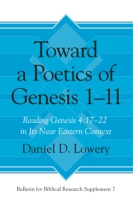
“I Will Walk Among You”
The Rhetorical Function of Allusion to Genesis 1–3 in the Book of Leviticus
G. Geoffrey Harper
“I Will Walk Among You”
The Rhetorical Function of Allusion to Genesis 1–3 in the Book of Leviticus
G. Geoffrey Harper
“I wonder if labouring to have allusion that is both intertextual and deliberate is to attempt to reinsert authors into a fundamentally text-orientated hermeneutic, and that what [Harper] offers is one (elegant) reading, rather than a reconstruction of purpose—but that would be to praise [Harper]’s book on terms other than those in which it is offered.”
- Description
- Reviews
- Bio
The face of Pentateuch scholarship has shifted dramatically in the last forty years, resulting in the questioning of many received truths and the employment of a host of new, renewed, and often competing methodologies by biblical scholars. This study sits at the intersection of these recent interpretive trends. G. Geoffrey Harper uses insights from the fields of intertextuality, rhetorical criticism, and speech act theory to create a methodological framework, which he applies to three Leviticus pericopes. Chapters 11, 16, and 26 are examined in turn, and for each the assessment of potential parallels at lexical, syntactical, and conceptual levels reveals a complex web of interconnected allusion to the creation and Eden narratives of Genesis 1 and 2–3. Moreover, Harper probes the theological and rhetorical import of these intertextual connections and explores how Leviticus ought to be understood in its Pentateuchal context.
This comprehensive study of the connections between these two sections of the Hebrew Bible sheds light on both the literary artistry of these ancient texts and the persuasive purposes that lie behind their composition.
“I wonder if labouring to have allusion that is both intertextual and deliberate is to attempt to reinsert authors into a fundamentally text-orientated hermeneutic, and that what [Harper] offers is one (elegant) reading, rather than a reconstruction of purpose—but that would be to praise [Harper]’s book on terms other than those in which it is offered.”
“This highly recommended study provides a lot of material for further reflection on the theology and composition of the Pentateuch. And it invites you to leave the conventional path for this reflection.”
G. Geoffrey Harper is Lecturer in Old Testament at Sydney Missionary and Bible College.
Also of Interest
Mailing List
Subscribe to our mailing list and be notified about new titles, journals and catalogs.





